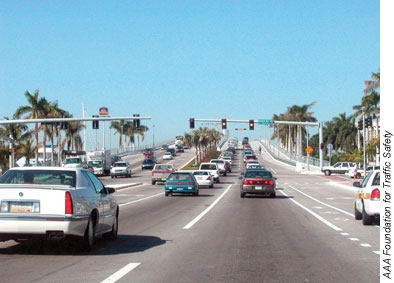
Gas mileage is an important consideration in most peoples' budget. When you spend $40 to $100 on gas each week, better fuel economy can make a direct improvement in your savings. Here are some steps you can take to get better gas mileage by adjusting the way you drive.
If you drive like the police are always after you, you will get worse gas mileage than someone who drives casually. Your gas mileage will improve when you eliminate the rapid starts, braking to a stop, and flooring the accelerator, always taking the traffic situation into account. These ideas are part of what is called hypermiling, or driving using techniques that maximize fuel economy. Here are the basic casual driving steps that will help increase your gas mileage.

The first step is to eliminate rapid acceleration from a dead stop, such as from a red light or a stop sign. This really burns fuel quickly. If possible, if you don't have cars behind you, try to let off the brake when the light changes so your car starts rolling forward, then accelerate slowly until you get up to speed. Again, if you are in heavy traffic, this may not be possible, but even doing it a couple times a day helps your gas mileage. The idea is that starting from even a slight roll is more efficient than starting from a dead stop.
The next step you can take is to try and anticipate upcoming stops or slowdowns in traffic so you can let off the gas and coast towards the stop. Again, take the traffic behind you into consideration. If you are clear or in widely dispersed traffic, let off the gas as soon as you see the light ahead turn red. On long secondary roads, you may be able to time the light so that you coast towards it until it turns green, then slowly accelerate again. The concept here is to retain the car's kinetic energy, or stored energy that the gas has given it to get up to speed. If you brake, you waste that energy, and need to give the engine more gas to get it back.

Along the same lines of conserving stored energy, try to keep a distance in highway traffic so that you can coast a bit if cars ahead of you brake. By following the car ahead of you closely, when his brake lights come on, you have to brake as well, wasting the speed and energy that you built up. Then you will have to hit the gas again to get back up to speed. If you can avoid the stop and go by keeping a longer distance behind the traffic in front of you, your gas mileage will increase and you will use the car's energy more efficiently. If traffic is heavy and cars jump into any gap you leave, then this may not be feasible, but use it when you can to improve your gas mileage.
Cut back your highway speed if possible. It is reported that every 5 miles per hour you go over 60 mph equates to paying 30 cents more per gallon of gas. Use common sense on the highway. Coast down hills and don't rev up hills as traffic permits.
Good luck to you and I hope you can save some money by applying these ideas!